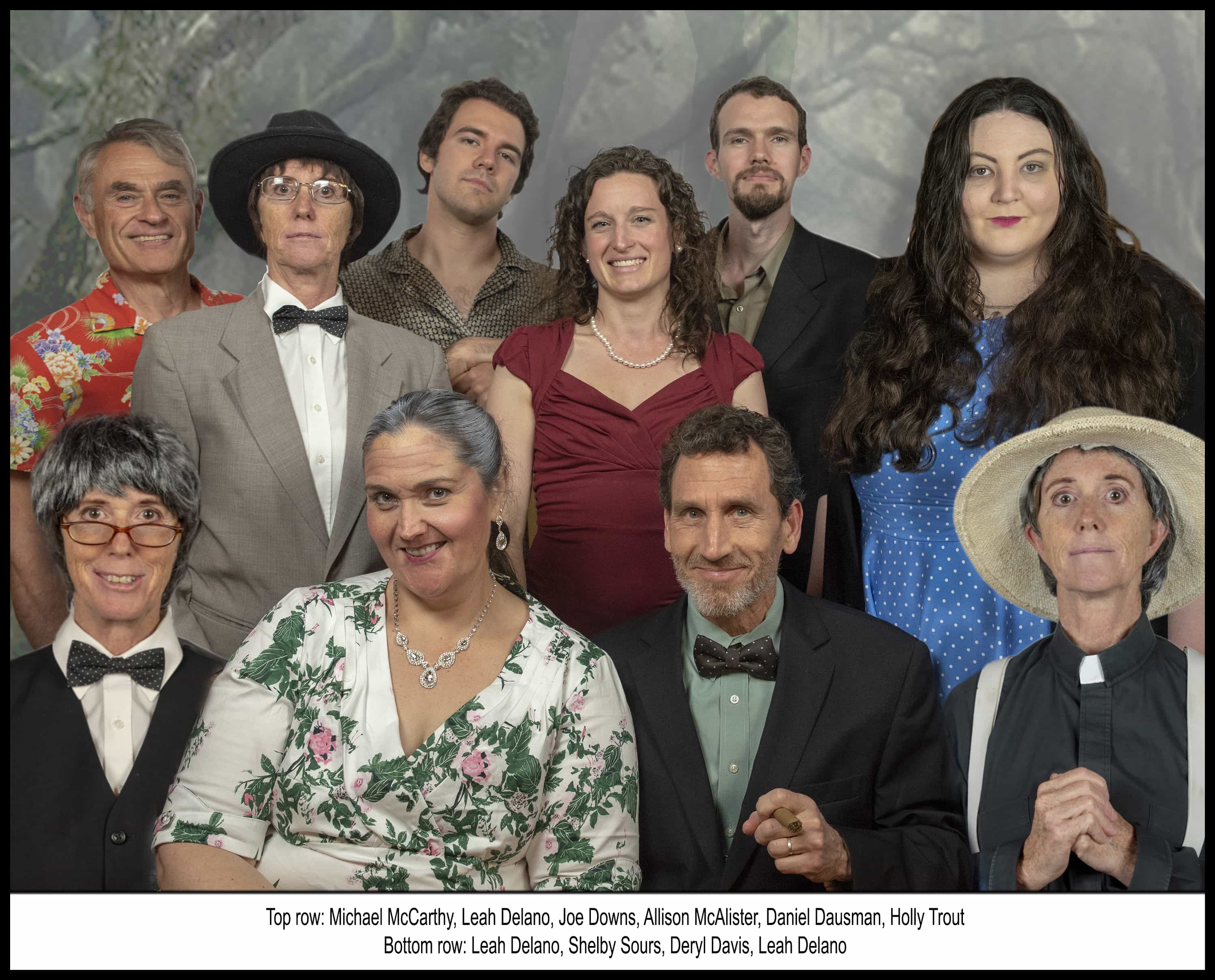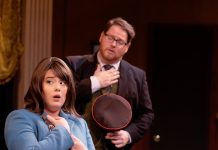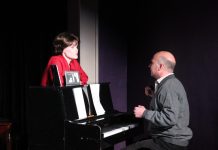Tennessee Williams famously wrote fragile female leads: Laura, delicate and easily shattered; Blanche, already defeated before she is forced to rely upon the kindness of strangers. Not so with Maggie the Cat, in Cat on a Hot Tin Roof, currently presented by the Rude Mechanicals at the Greenbelt Arts Center.

Maggie is the personification of the life force. Vital, fierce, sexy, whip-smart, determined, funny, needy, clear-eyed, and calculating when she needs to be. Allison McAlister fully inhabits the power Williams gives Maggie and fills out every nuance of the character in a riveting portrayal. Maggie dominates the first act, as she uses every weapon in her arsenal to bring her alcoholic, emotionally deadened husband Brick (Joe Downs) to some even small semblance of life. The musicality of her delivery of Williams’ words is magical.
In particular, she wants Brick to want her. Maggie is beautiful and desirable – in McAlister’s performance you can practically see the pheromones – but, unlike the men who undress her with their eyes on the street, Brick is indifferent, much preferring the anesthesia of the bottle to his wife’s body. And Maggie knows that in the spectacularly dysfunctional Pollitt family, fertility is destiny: give Brick’s father, Big Daddy (Deryl Davis) a grandchild, and the family fortune will be hers and Brick’s. Fail, and Brick’s awful, avaricious older brother Gooper (Daniel Dausman), his equally awful but prodigiously fecund wife Mae (Holly Trout), and their ever-increasing brood of “no-neck monsters” will inherit the family plantation.
The problem is acute because Big Daddy is dying of cancer. He doesn’t know it yet, because the rest of the family is hiding the truth from him so he can have a happy 65th birthday. Nothing so unusual there. In the Pollitt family, truth is a stranger, and as Big Daddy says frequently in the second act, “mendacity” reigns. Every character lies to the other characters; excepting Maggie, all the characters lie to themselves. The corruption of deception has seldom been more tellingly explored.
Big Daddy is the one character in the play other than Maggie in whom the life force runs strong. Believing that he has a clean bill of health, Big Daddy revels in the 15 or 20 years of life he sees before him. Davis, loud, angry, irascible, cigar clenched in his teeth, emphasizes the drive and cruelty that created Big Daddy’s self-made wealth. Davis’ performance felt rushed at times, but – like Stanley Kowalski, a case study of the life force not necessarily being a force for good – his Big Daddy dominates the other characters (again, excepting Maggie), notably in a lengthy second act scene with Brick.
Maggie and Big Daddy share one other important characteristic, their understanding and compassion for Brick’s homoerotic bond (about which Williams himself, in his public statements, was ambivalent) with his now-dead best friend, Skipper. Brick cannot find similar compassion for himself, his unresolved grief and insistence that his relationship with Skipper was “clean” being a source of his alcoholism. Big Daddy also accepts matter-of-factly the apparent homosexuality of the long-dead male couple who employed him before he took over the plantation. Together with his bitter hatred toward his wife, this might lead to interesting speculation about his own underlying sexuality, though it would never occur to him or anyone else in the family to raise the question.
Despite constantly refilling his glass from the liquor cabinet, Downs’ Brick appears less drunk than simply quietly depressed in most of his scenes, save when he is challenged by Maggie or Big Daddy about his relationship with Skipper. Downs never quite masters the physicality of his character, either the grace of a former star athlete or the movement of someone with a recently broken ankle (for some reason, he is not given a cast to wear, despite a reference to one in the script). A greater sense of some residuum of the young god he once was would have added poignancy to the characterization.
Shelby Sours, in her oversized, shrill, transparently false graciousness as Big Mama, makes Big Daddy’s longstanding disdain for his wife understandable, though there may be unexplored possibilities for a fuller rounding of the character.
Director Michael F. McCarthy mounts a minimalist production in the Greenbelt Arts Center black box, keeping the focus squarely where it belongs, on the actors. Working with a language-laden script, he never lets the words bog down the flow of the story. His costumes, particularly the black slip and form-fitting dress for Maggie, are effective.
Ultimately, everything circles back to Maggie. After being offstage for much of the second act, she returns, not in the mode of her first act’s passion but as a cool observer, awaiting the opportunity to protect herself, Brick, and Big Daddy’s dream of a grandson from Brick against Gooper and Mae. Watching McAlister’s reactions to the other characters’ lines was a master class in the power of subtle physical acting.
The production overall is creditable in a show that is not an easy lift for a community theater. McAlister’s performance as Maggie makes it a must-see.
Running Time: The production runs 2 hours and 30 minutes, including one intermission
Cat on a Hot Tin Roof is playing at the Greenbelt Arts Center, 123 Centerway, Greenbelt MD, through June 22, 2019. For tickets, call 301-441-8770 or go online.




